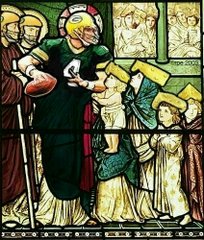Martin Luther faced this same attitude and here was how he responded to it:
God through Moses had issued a most rigorous prohibition against the impudence of inventing new forms of worship, as when He says: “You shall not offer in every place but at the place which the Lord your God will choose out of all your tribes to put His name and make His habitation there; thither you shall go, and thither you shall bring your burnt offerings and your sacrifices” (cf. Deut. 12:4––6). At that time the place appointed for worship was the temple at Jerusalem. The ark of the covenant was there, and God had promised that He would speak from the mercy seat to draw the people away from the diversity of idols to a united worship of God, to which He wanted to gather all together, if not in bodily presence and external works, at least in heart and prayer, if any were too far away from this place.
But the false prophets used to fight against this viewpoint and say: “God is everywhere; therefore He can be adored and worshiped in every place, both in Bethel as well as on any other mountain.” They did not have regard for the commandment of God. For when God fixes a certain manner and designates a certain place for His worship, it must not be said: “Wherever I will worship God, it will be pleasing to Him if only I do it in a godly and devoted manner,” or, “I shall make offerings to Him wherever it pleases me.” Isaiah, for example, censures this madness very severely, saying (Is. 57:5): “You burn with lust …… under every green tree.”
The Turks and Jews are accustomed to speak in this manner today, claiming that they are able to serve God outside of the unity of faith and the church of Christ. Mohammed claims that anyone is saved in his own religion if he prays, if he gives alms, if he does other good works. It is not necessary for him to be a Christian or that he should be in the unity of Christ and the church. In the papacy also all corners were occupied with chapels, convents, and idolatry of every kind. Therefore Hosea cries: “This example of Jacob by no means confirms your idolatry. He did, indeed, struggle with the angel, but you should have remembered that the Lord God of hosts led Israel out of Egypt through the prophet. But where is this God to be found? Where has He made a memorial for His name? Where is this memorial?
 Where the ark of the covenant is” (cf. Ex. 20:24).
Where the ark of the covenant is” (cf. Ex. 20:24).This is true, indeed, that God is not bound, neither to Jerusalem nor to any other place, and that He is able to save also elsewhere. No one will deny this. But try it and see what you will get! If you invent forms of worship according to your own judgment, you will be in danger of God’s wrath. By His almighty power God could save the human race without Christ, without Baptism, and without the Word of the Gospel. He could have illuminated men’s hearts inwardly through the Holy Spirit and forgiven their sins without the ministry of the Word and of ministers. But it was not His will to do so. And God very strictly prohibited all erring forms of devotion and worship.
When hypocrites say: “Whatever is done with good intention is pleasing to God,” those self-chosen devotions are to be condemned, and men should be reminded that they should direct their eyes where God has revealed Himself. We must not say: “Paul preached at Rome, therefore Christ is there. James is buried at Compostela in Spain, therefore God should be worshiped there by the invocation of Saint James.” By no means! Yet [are not] many miracles are performed there?
My reply is that God abominates and condemns all erring thoughts outside the one and only revelation made in the Word and sacraments, to which He wished to gather us and in which He wished to include us. For this reason Christ sent His disciples with this command: “Go therefore and teach all nations, baptizing them in the name of the Father and of the Son and of the Holy Spirit, teaching them to observe all that I have commanded you” (Matt. 28:19––20), and “He who believes and is baptized will be saved” (Mark 16:16).
 He wants us to be gathered in connection with the
He wants us to be gathered in connection with the  Word and Baptism as by a sure and infallible sign because He wants to save us and help us, just as He promised He would listen at the mercy seat among the people of Israel.
Word and Baptism as by a sure and infallible sign because He wants to save us and help us, just as He promised He would listen at the mercy seat among the people of Israel.If you want to be absolved from your sins in this manner, go to your pastor, or to your brother and neighbor if your pastor cannot hear you; he has the command to absolve you and comfort you. Do not invent a special absolution for yourself. If you want to receive the Lord’s Supper, go to the assembly of the church and the public congregation and receive it there.
Do not devise a special administration and use of the sacraments. For God does not want us to go astray in our own self-chosen works or speculations, and so He gathers us together and encloses us within the limits of the Word so that we are not tossed about by every kind of doctrine (cf. Eph. 4:14). This happened to us under the papacy when we despised Baptism, the Lord’s Supper, and the remission of sins and made pilgrimages meanwhile to Saint James, Borne, and Jerusalem, as though God were not present in all the churches and congregations which have His Word and sacraments. Finally, there was an infinite variety of sects and orders, each of which had its peculiar, segregated ritual in distinction from the ritual and ordinance of God. Nor could those innumerable forms of fornication, as Holy Scripture calls them, be prevented except by casting off our own works. So God wants all these things to be removed, and He sets forth His Word, which says: “Here you shall adore, worship, and make offerings. In the Word, in the Lord’s Supper, and in Baptism you have the remission of sins. With these you will have to be satisfied if you wish to be saved.”
Martin Luther, vol. 6, Luther's Works, Vol. 6 : Lectures on Genesis: Chapters 31-37, ed. Jaroslav Jan Pelikan, Hilton C. Oswald and Helmut T. Lehmann, Luther's Works, 6:127 (Saint Louis: Concordia Publishing House, 1999, c1970).






No comments:
Post a Comment